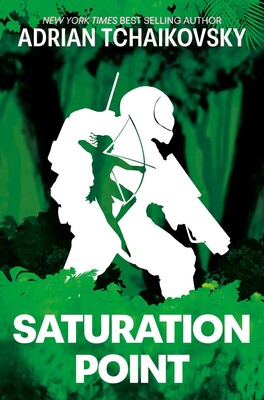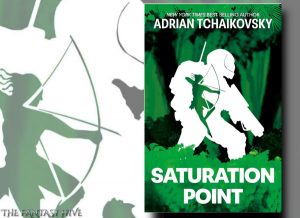SATURATION POINT by Adrian Tchaikovsky (BOOK REVIEW)
A group of scientists and soldiers are hunted by mysterious enemies in a terrifying new climate thriller from the “Master of British SF”
Doctor Jasmine Marks is going back into hell.
The Hygrometric Dehabitation Region, or the “Zone,” is a growing band of rainforest on the equator, where the heat and humidity make it impossible for warm-blooded animals to survive. A human being without protection in the Zone is dead in minutes.
Twenty years ago, Marks went into the rainforest with a group of researchers led by Doctor Elaine Fell, to study the extraordinary climate and see if it could be used in agriculture. The only thing she learned was that the Zone was no place for people. There were deaths, and the programme was cut short.
Now, they’re sending her back in. A plane crash, a rescue mission, a race against time and the environment to bring out the survivors. But there are things Marks’s corporate masters aren’t telling her. The Zone keeps its secrets, and so does Doctor Fell…
Tchaikovsky’s novels have explored many alien environments which range from challenging to humans to utterly inhospitable, for example most recently in the aggressively collaborative biome of Alien Clay and the high-pressure atmosphere and screaming radio-waves of Shroud. Humans’ mere existence in these impossibly constrained environments required significant technological protections and adaptations.
I n Saturation Point he throws his characters into another unsurvivable environment, only this time it’s our Earth – or rather the Dehabitation Zone (DHZ) of a future climate-changed Earth. The tropics have been reclaimed by the jungle as an impossibly hot and humid band of land sprawls North and South from the equator tropics.
n Saturation Point he throws his characters into another unsurvivable environment, only this time it’s our Earth – or rather the Dehabitation Zone (DHZ) of a future climate-changed Earth. The tropics have been reclaimed by the jungle as an impossibly hot and humid band of land sprawls North and South from the equator tropics.
The climate crisis in literature has often been presented through the eye-catching motif of rising sea levels and flooded landscapes. However, the reality of long timescales for the ice to all melt and what can seem like relatively modest one metre sea level rises over the next century or so means this cli-fi trope doesn’t bite as hard as it could or should. But the climate crisis is much more complex than that, with extreme weather events, crop failures and water shortages being some of the more immediate effects.
In Saturation Point Tchaikovsky highlights another key – but rarely recognised – threat. In the opening of The Ministry for the Future Kim Stanley Robinson had a heat dome settling over India to create a region of long-lasting impossibly hot and humid conditions. A point where high temperature and 100% humidity meant that humans could not cool down by sweating – the sweat would not evaporate. Unable to maintain that precious window of liveable body temperatures (37 oC to about 40 oC) peoples’ own bodies cooked themselves to death and tens of thousands died.
Tchaikovsky extends that idea of a temporary heat dome into a permanent heat band around the Earth where explorers need survival suits and tents equipped with continuous personal air-conditioning. It is as though each suit/tent were a kind of refrigerator sucking heat from within and dumping it in the space outside. (If – like me – you ever kept a fridge in an under-stairs cupboard, you will have an idea of how much heat it pumps into its immediate surroundings).
The premise is a far more credible consequence of changed climate than the impossibly flooded London of J.G Ballard’s The Drowned World. More of a science-forecast than a science-fiction.
Of course – full of thought-provoking and educative science points as Saturation Point is – the first duty of any novelist is to tell a good story and Tchaikovsky fills his convincing setting with a compelling cast of characters pursuing (or pursued by?) a sinuously twisting and weaving plot.
The story is told in a kind of epistolary diary-entry way as Doctor Jasmine Marks reflects on the conspiracy of circumstances that led her back into the DHZ after a twenty year absence and then charts the variety of events and disasters that overtake the exploratory party. There are shades of Aliens in the experienced amateur being drafted into the professional recovery team to revisit an environment where her knowledge may be useful, although Marks is a far more fragile protagonist than Ripley. There are also echoes of Joseph Conrad’s Heart of Darkness in the exploration of an inhospitable environment in search of a Dr Livingstone style character who does not necessarily want to be found.
Marks’ diary/log entries flit from event to event with a kind of nervous energy. She is initially plucked from the dull isolation of carefully monitored home-working in service of an exploitative corporation. It is a culture where meeting anyone in person has become a rarity in a world where Covid-style infections and the climate crisis have converged. As she is thrust into a rescue mission looking for a lost plane deep in the DHZ, the journal style of narrative gives the novella the feel of Cloverfield or the Blair Witch Project.
Tchaikovsky touches on an another theme which I enjoy – that of the mutability and unreliability of memory. For example when Marks reflects on her last sight of her mentor Dr Fell
In my memory she’s not even wearing her hazard suit. Memory is fallible. Dreams overwrite the reality, fond fantasies inform the dreams.
I remember remembering it. But memory is a hard disk that overwrites itself constantly.
The group that Marks is attached to has the usual mix of technical support guys, grizzled soldiers and enigmatic corporate guy of whom Marks says.
I was watching Glasshower because that kind of corporate unflappability falls apart quick under pressure in my experience, but the heat slides off him like a duck.
As events inevitably whittle the troop down in the best tradition of Aliens there is the fun of seeing how long and how well each character might last and whether some of them (as in the horror spoof The Cabin in the Woods – also featuring Sigourney Weaver) might even return from the dead.
Tchaikovsky’s writing is as entertainingly fluid as ever with little Easter eggs for the discerning reader, for example when Glasshower summarises their objective
“For now, just this: we’re investigating activity in the Zone. Someone’s here and nobody’s owning up to it. And so we’re going on a bear hunt.”
The vibrant humid setting has some real-life antecedents as Marks notes
And I think about Chernobyl. The nuclear site, the way it regreened itself, radiation be damned.
And there is the truth about the Sahara desert, which was a humid savanna with lakes, rivers and vegetation between 15,000 and 5,000 years ago.
The comedian George Carlin once commented on all the ‘save the planet crap’ with the simple observation that the planet will be fine, it’s whether or not we humanity as a whole will be that we need to worry about. As Marks notes
Everyone was talking about how climate change would kill the planet but leave people standing. And here we are, standing on a part of the planet that would kill us dead without our suits, and yet it’s so full of life.
The life that Tchaikovsky describes is wonderfully alien, launching itself in a different direction to human evolution. While Marks’ original mission was in service of corporate interests to investigate ways to make the DHZ profitable, exploitable, Saturation Point ultimately highlights the power of nature. Hot blooded mammals had the ability to migrate to cold regions where the reptiles could not survive – there are no arctic snakes or crocodiles – but if the whole world becomes warmer we may fashion a habitat where the cold-blooded creatures could again master the Earth as completely as their ancestors the dinosaurs once did.
Of course, Saturation Point is a story not a science lecture and Tchaikovsky delivers an intriguing cast of a compelling but tortured protagonist, a suspiciously enigmatic entourage, and a central mystery that demands resolution. The science – the utile within the sweet dulce of Tchaikovsky’s storytelling – is seamlessly integrated, an essential part of the plot that braids entertaining and informative together. And at the end there is – of course – a delicious twist, foreshadowed but not foreseen.
Saturation Point is available now – you can order your copy on Bookshop.org

